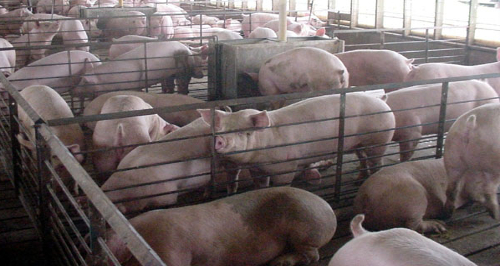
Reactions from GM-Fed Meat & Animal Products
Spending two days curled up on the bathroom floor violently ill was not what I expected from eating a pork chop from a pig fed genetically modified (GM) feed.
March 2, 2017 | Source: Institute for Responsible Technology | by Devona Bell
Spending two days curled up on the bathroom floor violently ill was not what I expected from eating a pork chop from a pig fed genetically modified (GM) feed.
If I were the only one, this blog wouldn’t be necessary.
I am one of the lucky canaries in the coalmine, very sensitive to toxicity, who react quickly and severely. Many others also react from GM-food and GM-fed animal products (dairy, eggs, and meat), often with delayed health issues, which makes it very challenging to figure out what to attribute it to. So many people react that it is a common practice today for functional medicine doctors to prescribe a non-GMO diet to their patients. There are many stories of healing and reversal of diseases from those eating foods that are organic, non-GMO, and pasture-raised animal products.
The question is why?
Why are many people reacting from GM-fed animal products?
In the fall of 2014 I moved from the DC-suburbs to a farm in the Blue Ridge mountains of Virginia. The plan was to raise my own meat, but in the meantime, I needed food. I have Celiac and am extremely sensitive to toxicity. I had been on an autoimmune protocol (AIP) for a couple of years at that time and was doing great. As a regenerative agriculture professional, I heartily embrace AIP’s stance on eating healthy pasture-raised meats fed a non-GM diet. The community I moved to has a large population of holistic people, and I was excited to find a lot of beyond organic food straight from farms. Being very busy with the move, I hadn’t yet done much research and bought some pork from a farmer who I had thought said he fed a non-GM diet to his pigs. I cooked up the pork chops for my family and was loving mine. I was half way through it when I had stabbing pains in my stomach. Then came the nausea; I was violently ill for two days.
I used to mourn that I am one of the canaries in the coal mine, reacting so strongly to GMOs and toxicity. Now I realize it is a blessing. My family had no outward immediate reactions from the pork as I did, but that doesn’t mean it didn’t do damage. I did go back to the farmer and found out that yes, indeed, he fed his pigs GM-feed. My previous pig farmer up in Northern Virginia feeds his pasture-raised pigs non-GM feed and I have no trouble with his pork, chickens, or turkeys. For my livestock, I decided to use a non-soy organic feed as I believe it is a cleaner healthier source of nourishment for them and ultimately me and my girls.
I looked for research to help explain why many get ill from GM-fed animal products, and here is what I found. Back in the 1990s the Director for the Center for Veterinary Medicine (CVM) at the US Department of Health and Human Services, Gerald B. Guest, questioned the safety of GM crops with regards to livestock and said the following: “…CVM believes that animal feeds derived from genetically modified plants present unique animal and food safety concerns. … Residues of plant constituents or toxicants in meat and milk products may pose human food safety problems.”
Dr. Jack Heinemann, professor in genetics and molecular biology at the University of Canterbury in New Zealand, states in his report on animals exposed to GM ingredients in animal feed: “There is substantial and credible literature that reports the detection of DNA and protein unique to GM in plants within animals and animal products.” In his summary, after reviewing extensive research, Heinemann says there is “… no reasonable uncertainty that GM plant material can transfer to animals exposed to GM feed in their diets or environment, and that there can be a residual difference in animals or animal-products as a result of exposure to GM feed”. What the difference is was not stated and is likely unknown at this time.
